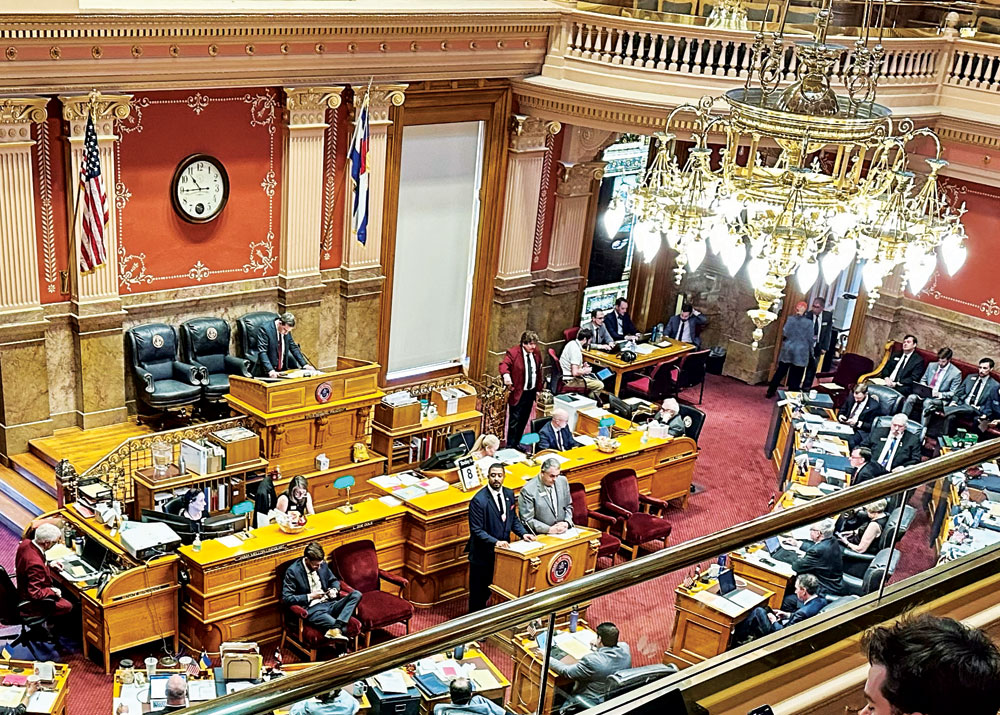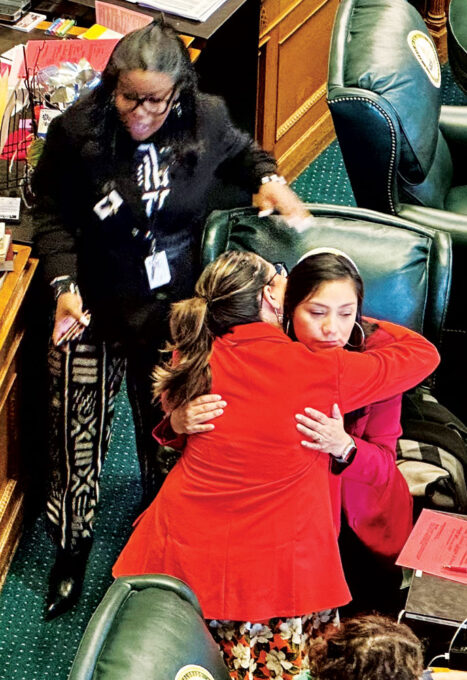
Colorado State Senator James Coleman urges the Senate to approve HB23-1249, which intended to reduce youth involvement in the court system. An amended version of the bill calling for a study of the issue passed through both chambers. Front Porch photo by Christie Gosch
Democrats Win Some, Lose Some During Legislative Session
The 2023 Colorado legislative session opened in January with high hopes by Democrats, who had won historic House and Senate majorities in the November 2022 elections.
Those hopes were tempered by the late evening of May 8, when the session ended in acrimony and recriminations after lawmakers struggled to resolve the two biggest issues of the session.
Here’s what was in play on the final weekend, when lawmakers held rare Saturday and Sunday meetings leading up to the 120th and final day.
Land-use defeat—The ambitious and much amended land-use bill championed by Gov. Jared Polis died on the last day of the session. The Senate had stripped the top-down, state-control provisions of the original SB23-213. House Democratic progressives restored some of those provisions when they got their hands on the bill. The Senate, anchored by a group of local-control suburban Democrats, refused to give in to the House changes, and the bill died. It was a major defeat for Polis, who promised the issue will be back. A companion bill, HB23-1255, actually passed without controversy. It bans cities from enacting growth limits.
Property tax relief passes, bitterly—The second major end-of-session issue was property tax relief. A complicated measure, SB23-303 proposed a reduction of property tax rates with losses of local government revenues to be backfilled with the diversion of some Taxpayer’s Bill of Rights surpluses. All of this will have to be approved by voters in November because it requires a change in TABOR refunds. Democrats tweaked amendments to the bill to attract the support of some local governments, drawing Republican rhetorical scorn during debate.
The bill passed the House on the evening of May 8 without the no votes of the House’s 19 Republicans, who walked out of the chamber. That’s a first in the memory of this writer. The measure will be on the November ballot as Proposition HH.
House Dems fight among themselves— During recesses on that last evening, a meeting of House Democrats degenerated into a rhetorical assault on Speaker Julie McCluskie, D-Dillon, led by Democratic ultra-progressive Rep. Elisabeth Epps of Denver. Democratic women of color accused McCluskie of not defending them enough against floor innuendos from conservative Republicans and hostile social media posts, and of not corralling GOP members more tightly.
Senate Democrats crack down—The Senate had been largely free of the House Democratic-Republican procedural conflicts this session. But when Republicans threatened to slow things down on that final Sunday and Monday, Democratic leaders lowered the hammer and limited debate. That ensured the passage of HB23-1311, a SB23-303 companion bill that will provide flat Taxpayer’s Bill of Rights refunds next year.
Criminal justice—The third major debate during the closing days was over HB23-1249. Originally the bipartisan measure proposed raising the minimum age for charging youths with crimes to 13. The current age is 10. Instead of going into the criminal or juvenile court systems, youths would be supervised and treated by local organizations called collaborative management programs. In the face of strong opposition, the bill finally passed on the last morning in a highly amended version that basically calls for a study of the issue.

Rep Serena Gonzales-Gutierrez gets hugs from colleagues on her last day as she transitions to her new City Council At-Large position. Front Porch photo by Christie Gosch
Setting Up The Session
When the session started, 30 members of the 65-member House were new, with many of them being young Democratic progressives.
Republicans were sobered by their November losses, and the rhetoric of 19 GOP House members warned early on that they would make things difficult for the majority.
That threat played out as the session unfolded. Republicans made long speeches on minor bills they supported, and several times delayed action by asking bills be read aloud in their entirety. Democratic majority leadership responded by invoking rules that limited the length of debate, something rarely done in past sessions.
Veteran legislative observers, including lobbyists, said new members sometimes weren’t interested in consulting interest groups about their bills, and that there was behind-the-scenes backbiting—like snarky Tweets—among House Democrats.
During the first part of the session, Democrats pushed through the GOP speechmaking and passed significant bill packages on gun control and protection of reproductive rights.
But House Democratic progressives had a mixed scorecard, losing bills to ban assault weapons, create “fairer” scheduling for workers, and allow cities to permit safe drug injection sites.
The Rest of The Issues
Budget—The 2023-24 state full budget package, which includes more than just the long appropriations bill (SB23-214), added up to $41.4 billion from all funding sources, a 4.2 percent increase. Projected higher Medicaid costs, 5 percent raises for state employees, a 3 percent increase in payments to agencies that provide services to the state (think doctors who serve Medicaid patients, for instance), and inflationary costs drove most of the increased spending.
Other Criminal Justice—This was an active area of legislation. Bills of interest that passed include limits on the use of restraints in state prisons (HB23-1013), admissibility of juvenile statements when police lie during interrogations (HB23-1042), toughening of auto theft laws (SB23-097), and restrictions on no-knock raids (SB23-109). An effort to toughen fentanyl laws (SB23-254) failed.
Education—Bills of note that passed included a $41 million increase in special education funding (SB 23-099), creation of a task force to study the state school rating system (HB 23-1241), a $27.3 million program to improve math teaching and student performance (HB 23-1231), a provision of mental health screening in secondary schools (HB 23-1003), and banning of corporal punishment in schools and childcare centers. There also were several bills passed that seek to improve adult education and workforce training.
Environment & energy—This also was a high-
interest area this session. Bills that passed dealt with air quality permits (HB23-1294, much amended), tighter utility regulation of utilities and limits on which rate-case expenses can be passed on to customers (SB23-291), reduction of greenhouse gas emissions (SB23-016), energy standards for appliances (HB23-1161), expanding the role and changing the name of the oil and gas conservation commission (SB23-285), and creation of a task force to study Colorado River issues (SB23-295). Lawmakers also passed a number of wildfire mitigation and suppression bills and approved the purchase of a second firefighting helicopter.
Firearms—This was the first hot issue of the session. Measures that passed included creation of a waiting period for delivery of firearms purchases (HB23-1219), strengthening the Red Flag law (SB23-170), increasing the minimum age to buy firearms (SB23-169), making it easier to sue gun manufacturers (SB23-168), and cracking down on “ghost guns” (SB23-279). But a proposed ban on assault weapons failed in committee with bipartisan opposition (HB23-1230).

Governor Jared Polis signs SB23-170, a bill that was co-sponsored by State Representative Jennifer Bacon and that strengthened the state’s Red Flag gun control law. Photo courtesy of Rep Bacon
Health care costs—Hospital costs were a major focus in this area and included measures to establish corrective action procedures for hospitals that fail to meet the minimum community investment thresholds (HB23-1243), some restrictions on hospital outpatient facility fees (HB23-1215) and hospital and medical cost transparency (HB23-1226 and SB23-252), and regulation of psychedelic mushrooms (SB23-290).
Housing—Beyond the late-breaking land-use bill, the legislative calendar was full of other housing measures. A proposal to allow local governments to impose rent controls failed (HB23-1115), and there were a variety of renters’ rights bills, including some restrictions on landlords (HB23-1095 and SB23-184), eviction protections (HBs 23-1120 and 1171), and habitability requirements (HB23-1171).
Reproductive rights—The session’s second big controversy after gun control was abortion. Majority Democrats efficiently pushed through bills to expand access to reproductive health services (SB23-189), strengthen legal protections for reproductive health care providers (SB23-188), and provide stronger regulation of agencies that counsel against abortions.
School funding—The annual school finance act (SB23-287 this year) set operating for school districts at $9.1 billion, an increase of about $670 million, funded almost entirely by dramatic increases in local property tax revenues. Base per pupil funding increases by $598.25, to $8,076.41, an 8 percent inflation increase. Average per-pupil funding is estimated at $10,579.
Todd Engdahl operates Capitol Editorial Services, which provides clients with research, reports and news on the state budget and other issues at the Colorado legislature. He’s a former executive city editor of The Denver Post, launched DenverPost.com and was a co-founder of the website Education News Colorado.




0 Comments